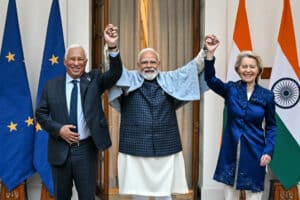Amid rising tensions over Kashmir, Pakistan’s envoy to South Africa has called for dialogue while condemning India’s recent air and drone strikes.

“We don’t want war, we want peace with India, but we will always defend our sovereignty and our territorial integrity against any invasion,” says Pakistan’s acting high commissioner to South Africa, Fahad Amjad.
He was reacting to the recent war between India and Pakistan over Indian-administered Kashmir.
Amjad was explaining Pakistan’s position regarding what Islamabad called India’s “unprovoked and unjustified attacks” using coordinated missile, air and drone strikes on multiple locations inside Pakistan recently on 6 and 7 May.
Areas affected by the attack included Sialkot, Shakargarh, Muridke, Bahawalpur, Kotli and Muzaffarabad. The conflict began with alleged terrorist attacks on tourists on 22 April, killing 26 people.
But Amjad said India blamed the attack on Pakistan. The disputed territory is the subject of various UN Security Council (UNSC) Resolutions.
Long-standing dispute rooted in history and religion
The core issue stems from a long-standing territorial dispute between India and Pakistan, dating back to the 1947 partition of India.
Both countries claim the entire region, but control only parts of it, leading to conflict and ongoing tensions.
The issue is further complicated by the region’s Muslim-majority population and the unresolved question of self-determination, which has been a major point of contention between India and Pakistan.
Since 2019, India has taken over the area as part of its union territory. But Amjad said India was not allowed to act unilaterally regarding the area and the final decision lay with the Kashmiri people through a plebiscite and via the UNSC.
ALSO READ: Six killed in school bus bombing in SW Pakistan
Water treaty dispute deepens mistrust
The 1960 Water Treaty between the two countries, which was brokered by the World Bank, often also fuelled the conflict.
Pakistan accused India of unilaterally suspending the water treaty, which regulates the water flow between the two countries.
“We are dependent for our water needs on those rivers which come from India-controlled territories.
“We can’t do it unilaterally because the treaty is guaranteed by the World Bank, and the treaty has a mechanism that, in case of a dispute, we can refer it to a third party, like arbitration, or the World Bank can decide about it.
“We will always follow the steps that we have in terms of the treaty,” Amjad said.
Civilian casualties and retaliation raise alarm
The situation was also exacerbated by the pro-government Indian media’s narrative that “we should crush Pakistan” and “we should attack Pakistan”, he said.
On 6-7 May, India hit between seven and eight targets in Pakistan. Between 20 and 22 people died in the attacks on the areas that India described as terrorist areas.
But according to Amjad, most of the victims were civilians, including children. Pakistan retaliated by shooting down some of the fighter jets that India used in the attacks. “In our response we said we will not target any civilians but only the military installations.”
The confrontation between the two countries continued for two to three days. It subsided when various international players engaged with the leaders of both countries.
ALSO READ: India and Pakistan agree to ceasefire after days of attacks
A ceasefire brokered by the US was achieved. “As the policy of our government, we want to continue the ceasefire. But the Jammu-Kashmir issue remained unresolved.”
Calls for South African mediation and global peace effort
During a seminar with civil society organisations in Sandton on Wednesday night some suggested that South Africa, which championed the Palestinian cause in the ongoing Middle East war, should be involved in attempts to resolve the Pakistan-India Kashmir dispute.
They claimed South Africa had to fulfil Nelson Mandela’s wish that the conflict should be resolved peacefully.
An international solution is needed, including taking the issue to the International Court of Justice. Zohra Kathrada, a niece of the late ANC stalwart Ahmed Kathrada, said as a family, they always stood with countries that were occupied.
“We stand in solidarity with any occupied country,” Kathrada said. Salman Khan said the Indian occupation of Jammu-Kashmir was as important as the occupation of Palestine by Israel. Fatima Domingo, of the SA Kashmir Action Group, said Pakistan response to India’s attacks was not aggression, but self-defence.
She condemned India for allegedly monopolising the water resources in the region. Speaking at the seminar, Amjad said Pakistan was ready for dialogue with India on all the issues, including Jammu-Kashmir.
‘We want to live in peace’
“We also welcome any kind of mediation from a friendly country. We want to live in peace. We don’t want war with any country.
“First, on this old issue, we will not attack. But if India attacks us, then we will have to respond. Second, we believe in the supremacy of international law, which we respect. We also expect that other countries should follow the policies, rules and regulations of international law,” Amjad said.
He expressed concern that India would do it again. “If something is done to Pakistan, we will respond to it.
“We also request that our international partners talk with India so that sense prevails and there are no confrontations. We want to resolve all issues with India through dialogue and in a peaceful manner.”
ALSO READ: Pakistan tests missile weapons system amid India standoff






